第十章 债券基础
债券基础介绍

一、债券概述
3、债券种类(按计息方式)
贴现债券
指债券券面上不附有息票,发行时按规定的折扣率,以低于债券面值 的价格发行,到期按面值支付本息的债券。贴现债券的发行价格与其 面值的差额即为债券的利息。
零息债券
指债券到期时和本金一起一次性付息、利随本清,也可称为到期付息 债券。付息特点一是利息一次性支付。二是债券到期时支付。
中已经计息的实际天数*票面金额/100 C. "按‘票面利率*(实际计息天数/365)/实际计息天数’方式计算" 每百元利息=票面利率×(本次计息期间实际天数/年实际天数)/本次计息期间实
际天数*本次计息期间中已经计息的实际天数*票面金额/100
注:A和C算法是“按平均值付息”;B算法是“按年实际天数付息” 其中,C计算方式是A计算方式的补充增强算法,用于债券期间不能按季被 年整除的债券,例如9个月债券。 当日应收利息=债券持定利率债券相对应的一种债券,它是指发行时规 定债券利率随市场利率定期浮动的债券,其利率通常根 据市场基准利率加上一定的利差来确定。浮动利率债券 往往是中长期债券。由于利率可以随市场利率浮动,采 取浮动利率债券形式可以有效地规避利率风险。
一、债券概述
5、债券种类(按偿还期限)
长期债券
一般说来,偿还期限在10年以上的为长期债券
t:起息日或上一付息日至估
AI C t m
值日的实际天数,含2月29日; TY:本付息周期所在计息年
TY 100 度的实际天数(从起息日起计
算的估值日所属的整年度,即
选中“2月29日计息”, 计息方式选择“按‘票 面利率/365’方式计 算”。
债券本身的完整计息年度),
AIC t m f TS 100
三、债券摊余成本和实际利率法
《债券的基础》课件

ห้องสมุดไป่ตู้债券市场
债券市场分为一级市场和二级市场,交易方式 也可分为线上和线下。
债券投资策略
1
债券投资的原则
要保持冷静、理性、稳健的投资
债券投资策略
2
态度,遵循“低买高卖”的投资原则。
• 等额分期购买 • 定期定额投资 • 恰当时机买入 • 多元化投资
结语
债券投资的优点
《债券的基础》PPT课件
债券是股票市场的核心组成部分。在这个课程中,我们将介绍债券的基本概 念、种类、评级、收益和风险等基础知识,以及债券市场的类型和投资策略。
什么是债券?
定义
债券是一种借入资本的证券,发行方承诺 在特定日期支付利息和本金。
类型
政府债券、企业债券、可转债和零息债券 是最常见的债券类型。
债券投资风险相对较低,同时有稳定的收益。适合谨慎和追求稳定收益的投资者。
债券投资的注意事项
应该根据自己的风险承受能力、资产配置规划和理财目标选择适合的债券投资产品。
债券投资的前景展望
随着金融市场的开放,中国债券市场将迎来更多的机遇,投资者也将有更多选择。
债券的收益和风险
收益率
债券的收益率常用于评估债券的收益。它是 以每年支付的利息和本金的比例来计算。
风险
1 利率风险
利率变动会影响债券价格,带来利 率风险。
2 信用风险
债券发行方违约的概率称为信用风 险,这也影响债券价格。
3 市场风险
市场波动会影响债券的价格和收益 率。
债券的评级和市场
债券评级机构
债券基础知识

债券基础知识债券是一种长期借款工具,通常被用于筹集企业或政府所需的资金。
债券市场是资本市场的重要组成部分,债券的发行、交易和投资是投资者需要掌握的基础知识之一。
一、什么是债券债券是指债务人委托信托人或代理人向债权人募集资金发行的一种利率、期限、数量及偿付方式特定的有价证券,是债务人对投资者发出的债权和债务关系的书面承诺凭证。
债券是被动性固定收益投资品种,它的特点是收益率较低、风险相对低、流动性强。
债券的回报率常常采用利率表示,称为票面利率。
债券的标的主要分为国债、地方债、企业债等。
二、债券的种类1. 政府债券:它是由政府发行的,是一种国债或地方政府债券,受国家信用背书,通常具有较高的安全性。
2. 企业债券:它是由企业或非政府机构发行的,与政府债券相比,其风险和收益率更高。
3. 投资级债券:这种债券的发行人信誉较好,在评级机构中通常被评为AAA等级,其风险较低,回报率一般低于高收益债券。
4. 高收益债券:它也被称作“恶性债券”,因为它的发行人信誉较差,评级通常为BB或以下,回报率较高。
三、如何理解债券价格债券价格是指债券在市场上的价格。
也就是投资者需要支付的价格。
与其他品种一样,债券价格受市场供求关系的影响。
当投资者买入债券时,他们需要支付债券的面值,又被称为票面价值。
然而,当市场利率上升时,投资者可以获得相对较高的利息回报,从而提高债券的价格。
反之,当市场利率下降,这证明其他投资品种的回酬率较低,投资者将购买更多的债券,从而提高其价格。
四、如何投资债券投资者可以通过购买债券或债券基金的方式来投资债券市场。
债券交易可以通过多种方式进行,例如贴现、佣金或经纪人交易,或通过电子交易平台进行。
债券基金是一种组合投资方式,它的投资组合通常由多种不同类型的债券组成。
由于规模大、专业管理、流动性高等优点,成为普通投资者更为普遍的投资方式。
总结:了解债券的基础知识,可以帮助投资者理解市场的情况和风险,同时也可以帮助不想浪费时机和资金的投资者,更好地进行投资决策。
第10章 债券的基础

(二)抵押、担保条款
按债券发行时有无抵押担保条款可将债券分为: • 信用债券:仅凭筹资人的信用发行的、没有抵押品和担保条
款的债券,只适用于信用等级高的债券发行人。
• 抵押债券:债券发行者以不动产或有价证券作为抵押品而发行
的债券。如果债务人到期不能按规定条件还本付 息,债券人可以行使抵押权,占有或拍卖抵押品。
17
(一)选择适当的贴现率
计算债券的价值所采用的适当贴现率 适当贴现率是投资者对该债券 适当贴现率 要求的收益率。 可以选取市场上其它类似债券的收益率作为参考利率进 行调整。 理解影响债券适当贴现率的因素:
Y n = R f ,n + D P + L P + T A + C A L L P + P U T P + C O N D Yn = n年 期 债 券 的 适 当 贴 现 率 R f ,n = n 年 期 政 府 债 券 的 适 当 贴 现 率 ( 到 期 收 益 率 ) D P=信 用 风 险 报 酬 LP=流 动 性 风 险 报 酬 TA=税 收 调 整 的 利 差 CA LLP=可 提 前 偿 还 而 产 生 的 溢 价 ( 正 利 差 ) PUTP=可 提 前 兑 付 而 产 生 的 折 价 ( 负 利 差 ) CO N D =可 转 换 性 而 导 致 的 折 价 (1 0 .1 )
券票面上标明的偿还日期,也称到期日。 偿还期限的不率: 票面利率 指债券每年支付的利息与债券面值的比例,通常用
年利率的百分数表示。
根据票面利率对债券进行分类
按照利息支付方式不同 利息支付方式不同,可分为: 利息支付方式不同
附息债券:在债券券面上附有息票(coupon)的债券, 附息债券 或是按照债券票面标明的利率及支付方式支付利息的债券。 零息债券:不定期支付利息,既可以贴现发行也可以按照 零息债券 面值平价发行。
债券基础知识
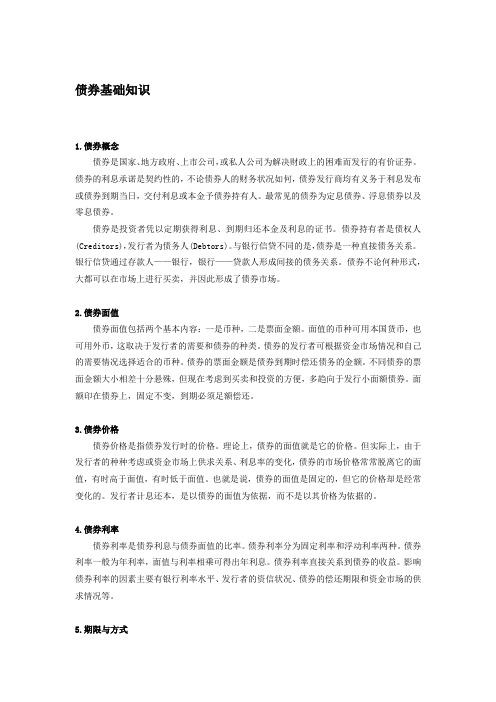
债券基础知识1.债券概念债券是国家、地方政府、上市公司,或私人公司为解决财政上的困难而发行的有价证券。
债券的利息承诺是契约性的,不论债券人的财务状况如何,债券发行商均有义务于利息发布或债券到期当日,交付利息或本金予债券持有人。
最常见的债券为定息债券、浮息债券以及零息债券。
债券是投资者凭以定期获得利息、到期归还本金及利息的证书。
债券持有者是债权人(Creditors),发行者为债务人(Debtors)。
与银行信贷不同的是,债券是一种直接债务关系。
银行信贷通过存款人——银行,银行——贷款人形成间接的债务关系。
债券不论何种形式,大都可以在市场上进行买卖,并因此形成了债券市场。
2.债券面值债券面值包括两个基本内容:一是币种,二是票面金额。
面值的币种可用本国货币,也可用外币,这取决于发行者的需要和债券的种类。
债券的发行者可根据资金市场情况和自己的需要情况选择适合的币种。
债券的票面金额是债券到期时偿还债务的金额。
不同债券的票面金额大小相差十分悬殊,但现在考虑到买卖和投资的方便,多趋向于发行小面额债券。
面额印在债券上,固定不变,到期必须足额偿还。
3.债券价格债券价格是指债券发行时的价格。
理论上,债券的面值就是它的价格。
但实际上,由于发行者的种种考虑或资金市场上供求关系、利息率的变化,债券的市场价格常常脱离它的面值,有时高于面值,有时低于面值。
也就是说,债券的面值是固定的,但它的价格却是经常变化的。
发行者计息还本,是以债券的面值为依据,而不是以其价格为依据的。
4.债券利率债券利率是债券利息与债券面值的比率。
债券利率分为固定利率和浮动利率两种。
债券利率一般为年利率,面值与利率相乘可得出年利息。
债券利率直接关系到债券的收益。
影响债券利率的因素主要有银行利率水平、发行者的资信状况、债券的偿还期限和资金市场的供求情况等。
5.期限与方式债券还本期限是指从债券发行到归还本金之间的时间。
债券还本期限长短不一,有的只有几个月,有的长达十几年。
债券基础知识
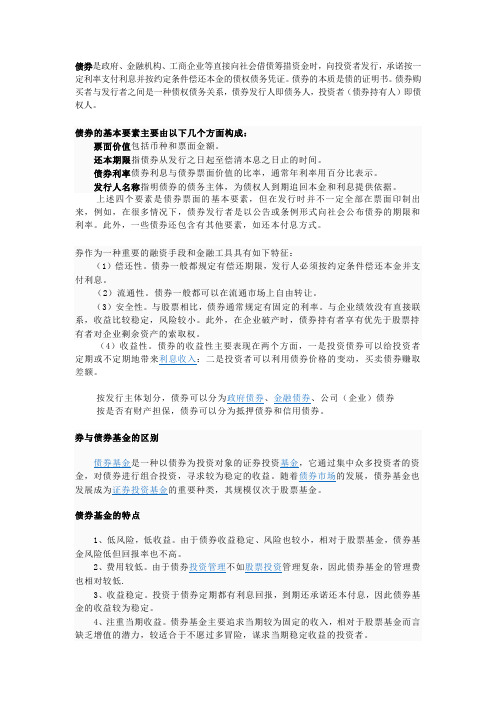
债券是政府、金融机构、工商企业等直接向社会借债筹措资金时,向投资者发行,承诺按一定利率支付利息并按约定条件偿还本金的债权债务凭证。
债券的本质是债的证明书。
债券购买者与发行者之间是一种债权债务关系,债券发行人即债务人,投资者(债券持有人)即债权人。
债券的基本要素主要由以下几个方面构成:票面价值包括币种和票面金额。
还本期限指债券从发行之日起至偿清本息之日止的时间。
债券利率债券利息与债券票面价值的比率,通常年利率用百分比表示。
发行人名称指明债券的债务主体,为债权人到期追回本金和利息提供依据。
上述四个要素是债券票面的基本要素,但在发行时并不一定全部在票面印制出来,例如,在很多情况下,债券发行者是以公告或条例形式向社会公布债券的期限和利率。
此外,一些债券还包含有其他要素,如还本付息方式。
券作为一种重要的融资手段和金融工具具有如下特征:(1)偿还性。
债券一般都规定有偿还期限,发行人必须按约定条件偿还本金并支付利息。
(2)流通性。
债券一般都可以在流通市场上自由转让。
(3)安全性。
与股票相比,债券通常规定有固定的利率。
与企业绩效没有直接联系,收益比较稳定,风险较小。
此外,在企业破产时,债券持有者享有优先于股票持有者对企业剩余资产的索取权。
(4)收益性。
债券的收益性主要表现在两个方面,一是投资债券可以给投资者定期或不定期地带来利息收入:二是投资者可以利用债券价格的变动,买卖债券赚取差额。
按发行主体划分,债券可以分为政府债券、金融债券、公司(企业)债券按是否有财产担保,债券可以分为抵押债券和信用债券。
券与债券基金的区别债券基金是一种以债券为投资对象的证券投资基金,它通过集中众多投资者的资金,对债券进行组合投资,寻求较为稳定的收益。
随着债券市场的发展,债券基金也发展成为证券投资基金的重要种类,其规模仅次于股票基金。
债券基金的特点1、低风险,低收益。
由于债券收益稳定、风险也较小,相对于股票基金,债券基金风险低但回报率也不高。
债券基础知识PPT课件

.
7
4.金融债券 (1)概念:指由银行和非银行金融机构发行的债券。但在不同的国家,归类是不同的。在英、 美等欧美国家,金融机构发行的债券归属于公司债券。而我国和日本等国家,金融机构发行的债 券才称为金融债券。 (2)分类: a.附息金融债券:债券上附有多期息票,发行人定期支付利息的金融债券。 b.贴现金融债券:以低于面值的价格贴现发行,而到期按面值还本付息(即利息为发行价与面值的 差额)的金融债券。
.
4
四、债券的分类
• 1.按发行主体划分:政府债券、金融债券、公司(企业)债券 • 2.按计息方式划分:单利债券、复利债券、累进利率债券 • 3.按付息方式划分:贴现债券、零息债券、附息债券 • 4.按利率确定方式划分:固定利率债券、浮动利率债券 • 5.按偿还期限划分:长期债券(10年以上)、中期债券(1年或1年以上、10年以下)、短期债券(1年以下) • 6.按债券形态划分:实物债券、凭证式债券、记帐式债券 • 7.按募集方式划分:公募债券 、私募债券
.
10
六、股票、债券、信贷融资方式的区别
.
11
7.国债回购交易 (1)概念:指证券买卖双方在成交同时就约定于未来某一时间以某一价格双方再进行反向成交 的交易,是一种以有价证券为抵押品拆借资金的信用行为。其实质内容是:证券的持有方(融资 者、资金需求方)以持有的证券作抵押,获得一定期限内的资金使用权,期满后则须归还借贷的 资金,并按约定支付一定的利息;而资金的贷出方(融券方、资金供应方)则暂时放弃相应资金 的使用权,从而获得融资方的证券抵押权,并于回购期满时归还对方抵押的证券,收回融出资金 并获得一定利息。
.
6
2.可转换公司债 (1)概念:可转换公司债是指发行人依照法定程序发行,在一定期限内依据约定的条件可以转 换成股份的公司债券。这种债券享受转换特权,在转换前是公司债形式,转换后相当于增发了股 票。可转换公司债兼有债权和股权的双重性质。 (2)分类:分离交易可转债、不可分离交易可转债。
债券基础知识
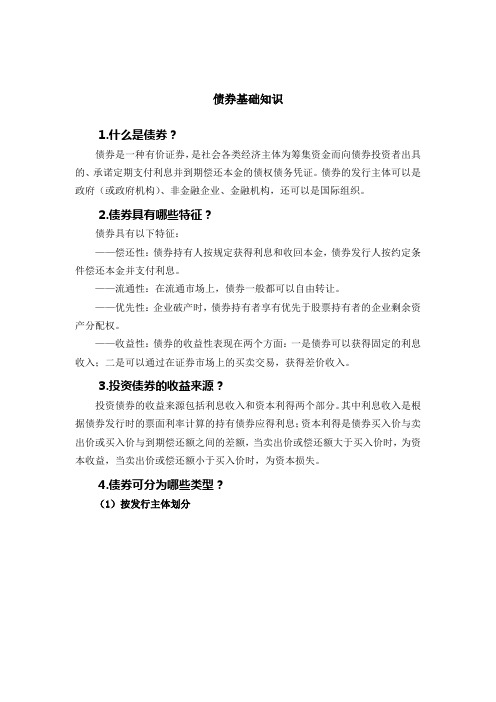
债券基础知识1.什么是债券?债券是一种有价证券,是社会各类经济主体为筹集资金而向债券投资者出具的、承诺定期支付利息并到期偿还本金的债权债务凭证。
债券的发行主体可以是政府(或政府机构)、非金融企业、金融机构,还可以是国际组织。
2.债券具有哪些特征?债券具有以下特征:——偿还性:债券持有人按规定获得利息和收回本金,债券发行人按约定条件偿还本金并支付利息。
——流通性:在流通市场上,债券一般都可以自由转让。
——优先性:企业破产时,债券持有者享有优先于股票持有者的企业剩余资产分配权。
——收益性:债券的收益性表现在两个方面:一是债券可以获得固定的利息收入;二是可以通过在证券市场上的买卖交易,获得差价收入。
3.投资债券的收益来源?投资债券的收益来源包括利息收入和资本利得两个部分。
其中利息收入是根据债券发行时的票面利率计算的持有债券应得利息;资本利得是债券买入价与卖出价或买入价与到期偿还额之间的差额,当卖出价或偿还额大于买入价时,为资本收益,当卖出价或偿还额小于买入价时,为资本损失。
4.债券可分为哪些类型?(1)按发行主体划分(2)按付息方式划分——零息债券:低于面值折价发行,到期按面值一次性偿还,期限在1年以上。
——贴现债券:低于面值折价发行,到期按面值一次性偿还,期限在1年以内。
——固定利率付息债券:发行时标明票面利率、付息频率、付息日期等要素,按照约定利率定期支付利息,到期日偿还最后一次利息和本金。
——浮动利率付息债券:以某一短期货币市场参考指标为债券基准利率并加上利差(发行主体可通过招标确定)作为票面利率,基准利率在待偿期内可能变化,但基本利差不变。
——利随本清债券:发行时标明票面利率,到期兑付日前不支付利息,全部利息累计至到期兑付日和本金一同偿付。
(3)按币种划分——人民币债券:以人民币计价的债券,包括境内机构发行的人民币债券和境外机构发行的熊猫债券,占中国债券市场的绝大部分。
——外币债券:以外币计价的债券。
债券基础知识篇

债券基础知识篇在当今的金融世界中,债券是一种重要的投资工具。
对于许多投资者来说,了解债券的基础知识是进行合理投资决策的关键。
接下来,让我们一起揭开债券的神秘面纱,深入了解一下它的相关知识。
首先,我们来弄清楚债券到底是什么。
简单来说,债券就是一种借款凭证,就好比你借给别人一笔钱,对方给你写了个借条,承诺在未来某个时候连本带利还给你。
而债券呢,就是由政府、企业或者金融机构等发行的这样一种“借条”。
债券的发行人可以是多种多样的。
政府发行的债券通常被称为国债,由于有国家信用作为担保,一般被认为是风险较低的投资选择。
企业发行的债券则根据企业的信用状况和经营情况,风险和收益水平会有所不同。
金融机构发行的债券也在市场上占有一定的份额。
债券有几个关键的要素。
第一个是票面价值,也就是债券上标明的金额,通常在债券到期时发行人需要按照这个金额偿还本金。
第二个是票面利率,这是发行人承诺支付给债券持有人的利息比率。
比如说,一张票面利率为 5%的债券,面值 100 元,每年就会支付 5 元的利息。
第三个是债券的期限,这指的是从债券发行到到期偿还本金的时间长度。
债券的期限可以短至几个月,也可以长达几十年。
债券的价格是会波动的。
这主要受到市场利率的影响。
当市场利率上升时,债券的价格通常会下降;反之,当市场利率下降时,债券的价格往往会上升。
这是因为新发行的债券会按照新的市场利率来定价,如果市场利率变高了,原来利率较低的债券就相对不那么吸引人了,价格就会下跌;反之亦然。
那么,投资者为什么要选择投资债券呢?一个重要的原因是债券可以提供相对稳定的收益。
特别是对于那些风险承受能力较低的投资者,债券是一种比较安全的投资选择。
而且,债券的收益通常比银行存款要高一些。
另外,债券在投资组合中还可以起到分散风险的作用。
因为债券的价格走势和股票等其他资产的价格走势往往不太相关,将债券纳入投资组合可以降低整个组合的风险。
在投资债券时,投资者也需要注意一些风险。
债券基础知识
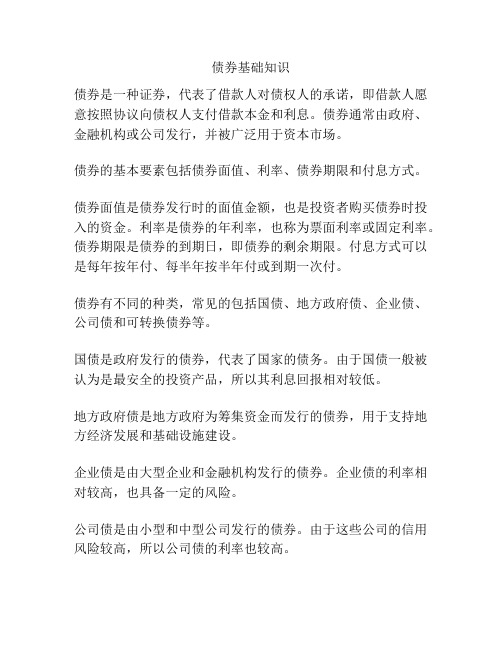
债券基础知识债券是一种证券,代表了借款人对债权人的承诺,即借款人愿意按照协议向债权人支付借款本金和利息。
债券通常由政府、金融机构或公司发行,并被广泛用于资本市场。
债券的基本要素包括债券面值、利率、债券期限和付息方式。
债券面值是债券发行时的面值金额,也是投资者购买债券时投入的资金。
利率是债券的年利率,也称为票面利率或固定利率。
债券期限是债券的到期日,即债券的剩余期限。
付息方式可以是每年按年付、每半年按半年付或到期一次付。
债券有不同的种类,常见的包括国债、地方政府债、企业债、公司债和可转换债券等。
国债是政府发行的债券,代表了国家的债务。
由于国债一般被认为是最安全的投资产品,所以其利息回报相对较低。
地方政府债是地方政府为筹集资金而发行的债券,用于支持地方经济发展和基础设施建设。
企业债是由大型企业和金融机构发行的债券。
企业债的利率相对较高,也具备一定的风险。
公司债是由小型和中型公司发行的债券。
由于这些公司的信用风险较高,所以公司债的利率也较高。
可转换债券是一种混合性质的债券。
它允许债权人将债券转换成公司股票,以参与公司的股东权益。
可转换债券具备固定收益和股权投资的特点,风险和收益相对较高。
债券的利息也称为债券收益。
在债券到期前,债券持有人通常可以获得固定的利息支付。
债券的收益率取决于债券的利率、市场利率和债券的风险程度。
债券的风险主要包括信用风险、利率风险和流动性风险。
信用风险是指债券发行人无法按时支付债券本金和利息的风险。
利率风险是指由于市场利率的变化,债券的价格可能发生波动的风险。
流动性风险是指债券市场上某些债券的买卖不活跃或难以变现的风险。
债券可以通过证券交易所或柜台交易进行交易,投资者可以通过购买债券来获取固定的利息收益。
债券也可以在到期日以面值的价格赎回。
总之,债券是一种重要的金融工具,投资者可以通过购买债券来实现资金的增值和风险的分散。
投资者在购买债券时应该了解债券的基本要素和风险,并根据自身的风险承受能力和投资目标进行选择。
债券基础知识

债券基础知识一、债券的概念1、概念债券(Bonds)是政府、金融机构、工商企业等机构直接向社会借债筹措资金时,向投资者发行,承诺按一定利率支付利息并按约定条件偿还本金的债权债务凭证。
2、债券的基本要素票面价值、还本期限、债券利率、发行人名称。
3、债券的特征A、偿还性B、流通性C、安全性D、收益性二、债券的分类1、按发行主体划分A、政府债券:包括国债(又叫“金边债券”)、地方政府债B、金融债券:由银行和非银行金融机构发行的债券C、公司债券(企业债券)2、按是否有财产担保划分A、抵押债券:按抵押品不同分为一般抵押债券、不动产抵押债券、动产抵押债券、证券信托抵押债券B、信用债券:政府债券、信用公司债3、按债券形态划分A、实物债券(无记名债券):标准格式的纸质债券,不记名、不挂式、可上市流通B、凭证式债券:凭证式国债是通过填制“国库券收款凭证”的方式发行的国债,可记名、可挂失、不可上市流通C、记账式债券(无纸化债券):以电脑记帐方式记录债权,通过证券交易所的交易系统发行和交易4、按是否可以转换为公司股票划分A、可转换债券:在特定时期可以按一固定比例转换成普通股票的债券B、不可转换债券:不可转换成普通股票的债券,即普通债券5、按付息方式划分A、零息债券(贴现债券):利息预付债券、贴水债券B、定息债券C、浮息债券:息票率是随市场利率变动而调整6、按是否提前偿还划分A、可赎回债券:在债券到期前发行人可以按事先约定的赎回价格收回的债券B、不可赎回债券:不能在债券到期前收回的债券7、按偿还方式划分A、一次到期债券:到期日一次性偿还全部本金B、分期到期债券:在发行时规定有不同到期日的债券,即分批偿还本金的债券8、按计息方式分类A、单利债券:所生利息不加入本金计算下期利息B、复利债券:按一定期限将所生利息加入本金再计算利息,逐期滚算的债券C、累进利率债券:指年利率以利率逐年累进方法计息的债券9、特殊类型债券根据债券的可流通与否还可以分为可流通债券和不可流通债券,或者上市债券或非上市债券三、债券相关业务1、债券的交易方式A、现货交易(现金现货交易)B、回购交易C、期货交易2、质押式回购交易指正回购方(卖出回购方、资金融入方)在将债券出质给逆回购方(买入返售方、资金融出方)融入资金的同时,双方约定在将来某一指定日期,由正回购方按约定回购利率计算的资金额向逆回购方返回资金,逆回购方向正回购方返回原出质债券的融资行为。
债券的基础知识

(四)按是否可以转换为公司股票划分
• 1.可转换债券 • 可转换债券是指在特定时期内可以按某一固定的比例转换 成普通股的债券,它具有债务与权益双重属性,属于一种 混合性筹资方式。由于可转换债券赋予债券持有人将来成 为公司股东的权利,因此其利率通常低于不可转换债券。 若将来转换成功,在转换前发行企业达到了低成本筹资的 目的,转换后又可节省股票的发行成本。根据《公司法》 的规定,发行可转换债券应由国务院证券管理部门批准, 发行公司应同时具备发行公司债券和发行股票的条件。
(九)按债券是否记名分类
• 按债券上是否记有持券人的姓名或名称,分为记名债券和 无记名债券。这种分类类似于记名股票与无记名股票的划 分。 • 在公司债券上记载持券人姓名或名称的为记名公司债券; 反之为无记名公司债券。两种债券在转让上的差别也与记 名股票、无记名股票相似。
(十)按是否参加公司盈余分配分类
(七)按偿还方式不同划分
• • 1.一次到期债券 一次到期债券是发行公司于债券到期日一次偿还全部 债券本金的债券; • 2.分期到期债券 • 分期到期债券可以减轻发行公司集中还本的财务负担。
(八)按计息方式分类
• • • • • • 1.单利债券 单利债券指在计息时,不论期限长短,仅按本金计息,所生利息 不再加入本金计算下期利息的债券。 2.复利债券 复利债券与单利债券相对应,指计算利息时,按一定期限将所生 利息加入本金再计算利息,逐期滚算的债券。 3.累进利率债券 累进利率债券指年利率以利率逐年累进方法计息的债券。累进利率债 券的利率随着时间的推移,后期利率比前期利率更高,呈累进状态。
• 2.定息债券 • 固定利率债券是将利率印在票面上并按其向债券持有 人支付利息的债券。该利率不随市场利率的变化而调整, 因而固定利率债券可以较好地抵制通货紧缩风险。 •
债券基础知识重点
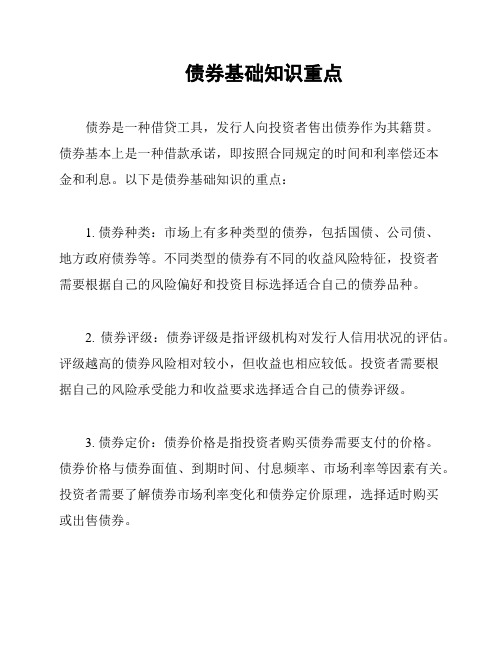
债券基础知识重点
债券是一种借贷工具,发行人向投资者售出债券作为其籍贯。
债券基本上是一种借款承诺,即按照合同规定的时间和利率偿还本
金和利息。
以下是债券基础知识的重点:
1. 债券种类:市场上有多种类型的债券,包括国债、公司债、
地方政府债券等。
不同类型的债券有不同的收益风险特征,投资者
需要根据自己的风险偏好和投资目标选择适合自己的债券品种。
2. 债券评级:债券评级是指评级机构对发行人信用状况的评估。
评级越高的债券风险相对较小,但收益也相应较低。
投资者需要根
据自己的风险承受能力和收益要求选择适合自己的债券评级。
3. 债券定价:债券价格是指投资者购买债券需要支付的价格。
债券价格与债券面值、到期时间、付息频率、市场利率等因素有关。
投资者需要了解债券市场利率变化和债券定价原理,选择适时购买
或出售债券。
4. 债券收益率:债券收益率是指投资者持有债券期间所获得的
收益率。
债券收益率与债券价格、到期时间、付息频率、市场利率
等因素有关。
投资者需要了解债券收益率计算方法和债券收益率与
价格的反向关系,判断债券收益率是否具有吸引力。
5. 债券买卖:债券可以在证券市场进行买卖。
投资者通过证券
公司开通证券账户,即可参与债券交易。
投资者需关注债券市场行
情和流动性情况,在合适的时机进行买卖操作。
以上是债券基础知识的重点,希望本文能为投资者提供参考,
帮助投资者更好地理解债券市场,选择合适的债券品种和买卖时机,创造更多的投资收益。
债券基础知识了解债券的定义与特点

债券基础知识了解债券的定义与特点债券基础知识:了解债券的定义与特点债券是一种固定收益金融工具,广泛应用于企业和政府部门的融资需求。
作为债务的一种形式,债券代表了借款人对债权人的承诺,承诺在特定期限内支付利息并偿还本金。
本文将介绍债券的定义、特点以及债券市场的发展。
一、债券的定义债券是指一种借贷关系,债务人发行债券向债权人筹集资金,并在约定的期限内支付利息和本金。
债券的主要组成部分包括:1. 面值:债券的面值即借款金额,也称为票面值或本金。
2. 期限:债券的期限是指发行人承诺在规定的时间内支付利息和偿还本金的期限。
3. 利息:债券的利息即投资人持有债券期间获得的收益,通常以固定利率或浮动利率形式支付。
4. 发行人:债券的发行人可以是政府、企业或金融机构等。
二、债券的特点债券作为一种投资工具,具有以下几个特点:1. 固定收益:与股票不同,债券作为债权工具,其收益率是固定的。
债券持有人可以通过定期利息支付和到期时的本金偿还,获得稳定的收益。
2. 优先偿还权:在资金分配中,债券持有人享有优先偿还权。
在破产或清算时,债券持有人排在股东之前优先获得偿还。
3. 期限多样化:债券市场上存在着各种不同期限的债券,投资者可以根据自己的需求选择短期或长期的债券。
不同期限的债券具有不同的风险和回报特性。
4. 流动性:债券市场具有较高的流动性,投资者可以通过债券交易市场进行买卖,实现资金的迅速调配。
5. 信用评级:债券的发行人通常会接受独立机构的信用评级,以评估其债务偿还的能力。
这些评级信息对投资者来说是重要的参考指标。
三、债券市场的发展随着经济全球化和金融市场的发展,债券市场逐渐成为全球资本市场的重要组成部分。
债券市场的发展主要体现在以下几个方面:1. 市场规模的扩大:随着借款需求的增加,债券市场的规模不断扩大。
政府债券、企业债券、金融债券等品种不断涌现。
2. 产品创新:债券市场的发展推动了各种创新型债券的出现,例如可转债、可交换债等。
债券基础知识

债券基础知识学习下关于债券基础知识,大致可以理解,为什么利息上升,债券要下跌,因为相同资金债券相对收益低了,自然要跌。
债券基金特征:偿还性,流通性,安全性,收益性(转自投基摸狗):-----话说古时候,渔村的老王是非常实在的一个穷人,看到别人下海打渔能赚钱,自己也心动了,但是那,自己积蓄有限,买船不够,那时候又没有现在的银行,去钱庄借钱的话老王也没有太多抵押物,只能向别人借钱。
老王老实巴交,大家都夸奖,所以大家也都愿意借钱给老王(这就是债券就是信用的本质),大家也都认为老王到期能还得起钱并支付利息(这是债券的安全性和收益性),老王向大家借钱的凭证就是债券,债券约定1000枚铜钱一年后偿还本金并额外支付50枚铜钱(这就是债券的收益性)。
老王的债券一年以后才能到期,同村的小李买了1000枚铜板的老王发的债券半年以后家里有人生病,继续大额资金,所以就想着变现老王的债券,这就需要一个交易场所,德高望重的村长家就成了交易场所,年事已高的老刘前些年依靠打渔的有些积蓄,就可以到村长家买下小李持有的债券(这就是债券的流动性)。
老王买船以后勤勤恳恳赚钱,结果快到年底了,遇到大风浪,船翻了,那时候也没有保险公司,老王这一年辛辛苦苦没赚到钱,本金也没了,借的钱也就没法还了,老刘等人买的老王的债券就跌价到250个铜板了,安全性没了。
老刘买债券的钱是自己准备养老的,出现这样的情况老刘就很着急,这时候就去找村长寻求一下解决方案,艺高人胆大之前走南闯北十多年的赵裁缝觉得老王人品可靠,虽然暂时还不上钱,但是过几年时间肯定会还,就以300铜板的价格买入老王的1000枚铜板的债券,反正也不吃亏。
老刘担心的养老金问题也解决了。
但是几个月老王遇到一个贵人,贵人很多年前落难时候被老王接济过,现在来报恩一下子给了老王一大笔钱,老王的债券得到兑付,低价买老王债券的赵裁缝在几个月时间里不仅得到本金面值和利息收益50个铜板,还获得了面值与购买值的差价收益700枚铜板,这就是债券收益性。
第十章 债券基础
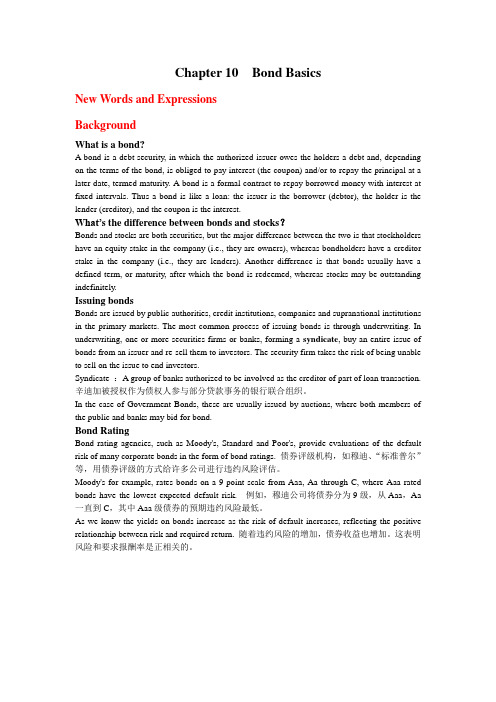
Chapter 10 Bond BasicsNew Words and ExpressionsBackgroundWhat is a bond?A bond is a debt security, in which the authorized issuer owes the holders a debt and, depending on the terms of the bond, is obliged to pay interest (the coupon) and/or to repay the principal at a later date, termed maturity. A bond is a formal contract to repay borrowed money with interest at fixed intervals. Thus a bond is like a loan: the issuer is the borrower (debtor), the holder is the lender (creditor), and the coupon is the interest.What’s the difference between bonds and stocks?Bonds and stocks are both securities, but the major difference between the two is that stockholders have an equity stake in the company (i.e., they are owners), whereas bondholders have a creditor stake in the company (i.e., they are lenders). Another difference is that bonds usually have a defined term, or maturity, after which the bond is redeemed, whereas stocks may be outstanding indefinitely.Issuing bondsBonds are issued by public authorities, credit institutions, companies and supranational institutions in the primary markets. The most common process of issuing bonds is through underwriting. In underwriting, one or more securities firms or banks, forming a syndicate, buy an entire issue of bonds from an issuer and re-sell them to investors. The security firm takes the risk of being unable to sell on the issue to end investors.Syndicate :A group of banks authorized to be involved as the creditor of part of loan transaction. 辛迪加被授权作为债权人参与部分贷款事务的银行联合组织。
- 1、下载文档前请自行甄别文档内容的完整性,平台不提供额外的编辑、内容补充、找答案等附加服务。
- 2、"仅部分预览"的文档,不可在线预览部分如存在完整性等问题,可反馈申请退款(可完整预览的文档不适用该条件!)。
- 3、如文档侵犯您的权益,请联系客服反馈,我们会尽快为您处理(人工客服工作时间:9:00-18:30)。
Chapter 10 Bond BasicsNew Words and ExpressionsBackgroundWhat is a bond?A bond is a debt security, in which the authorized issuer owes the holders a debt and, depending on the terms of the bond, is obliged to pay interest (the coupon) and/or to repay the principal at a later date, termed maturity. A bond is a formal contract to repay borrowed money with interest at fixed intervals. Thus a bond is like a loan: the issuer is the borrower (debtor), the holder is the lender (creditor), and the coupon is the interest.What’s the difference between bonds and stocks?Bonds and stocks are both securities, but the major difference between the two is that stockholders have an equity stake in the company (i.e., they are owners), whereas bondholders have a creditor stake in the company (i.e., they are lenders). Another difference is that bonds usually have a defined term, or maturity, after which the bond is redeemed, whereas stocks may be outstanding indefinitely.Issuing bondsBonds are issued by public authorities, credit institutions, companies and supranational institutions in the primary markets. The most common process of issuing bonds is through underwriting. In underwriting, one or more securities firms or banks, forming a syndicate, buy an entire issue of bonds from an issuer and re-sell them to investors. The security firm takes the risk of being unable to sell on the issue to end investors.Syndicate :A group of banks authorized to be involved as the creditor of part of loan transaction. 辛迪加被授权作为债权人参与部分贷款事务的银行联合组织。
In the case of Government Bonds, these are usually issued by auctions, where both members of the public and banks may bid for bond.Bond RatingBond rating agencies, such as Moody's, Standard and Poor's, provide evaluations of the default risk of many corporate bonds in the form of bond ratings. 债券评级机构,如穆迪、“标准普尔”等,用债券评级的方式给许多公司进行违约风险评估。
Moody's for example, rates bonds on a 9-point scale from Aaa, Aa through C, where Aaa-rated bonds have the lowest expected default risk. 例如,穆迪公司将债券分为9级,从Aaa,Aa 一直到C,其中Aaa级债券的预期违约风险最低。
As we konw the yields on bonds increase as the risk of default increases, reflecting the positive relationship between risk and required return. 随着违约风险的增加,债券收益也增加。
这表明风险和要求报酬率是正相关的。
Types of bonds1、Fixed Rate BondA bond where the coupon’s interest rate remains fixed for the entire term. Interest rate movements affect the bond’s price not the coupon.固定利率债券在整个债券有效期限内,债券的息票利率保持不变的债券。
利率的变动影响债券的价格而非息票。
2、Floating Rate Note(FRN)A bond where the coupon’s interest rate is changed periodically in accordance to a specific market rate.浮动利率债券(FRN)息票利率根据一定市场利率而发生周期性变化的债券。
3、Zero Coupon BondA bond that is issued and sold at a discount, pays no coupons and provides payment of the face value at maturity.零息债券打折出售的到期不支付利息只支付面值的债券。
4、Junk BondA bond that is rated by a ratings agency as being below investment grade and investment in the bond is high risk.垃圾债券被信用级别评定机构评定为低于投资级别的投资风险高的债券。
5、Investment GradeBond rated BBB and above or Baa and above by Standard & Poor’s and Moody’s Investor Service respectively投资级别分别被标准普尔和穆迪投资者服务公司评定为BBB以上或Baa以上的债券。
6、Municipal bondMunicipal bond is a bond issued by a state, U.S. Territory, city, local government, or their agencies. Interest income received by holders of municipal bonds is often exempt from the federal income tax and from the income tax of the state in which they are issued.市政债券是美国最受欢迎的避税投资工具之一。
这些债券是由州及地方政府或者他们的代理机构发行的,可以免交联邦所得税,而且,如果投资者是居住在债券发行地的话,很可能还可以免交州或者地方所得税。
参考译文第十五章债券基础介绍提起投资,人们首先会想起股票市场。
毕竟,股票令人兴奋。
报纸甚至当地的晚间新闻主播都详细追踪报道股票市场的变化。
投资者在股票市场上获利的故事不足为奇。
而债券,在另一方面,并不具有股票同样的吸引力。
这个术语似乎很神秘而且困扰着普通人。
另外,债券更加令人生厌---尤其当处于凶猛的牛市,它们似乎会更显得不及股票重要。
尽管如此,它在熊市来临时让投资者想起了他的优点,安全而稳定。
事实上,对于大多数投资者来说,最明智的莫过于至少拿一部分资金投资债券。
本章希望能帮助你认识到债券是否适合你,我们将向你介绍这些基本知识,例如债券是什么,债券的不同种类及它们的重要特征,怎样运作,怎样购买等。
债券有许多特征你需要了解,所有这些特征在决定债券价值和多大比例的债权在投资组合中是合适的都起到举足轻重的作用。
票面价值票面价值(又称面值或本金),是指当债券到期应付时持有者能够收回的货币总量,新发行的债券通常按票面价值出售,公司债券的票面价值通常是1000美元,政府债券的面值远高于此。
令人们混淆的是票面价值并不等同于债券的价值.债券的价格会根据许多变量而发生波动,当债券在高于其面值的水平上交易,就被称之为溢价出售;当债券在低于其面值的水平上交易,就被称之为折价出售。
Answers for chapter 15ⅠAnswer the following questions in English:1. When is bond said to be selling at a premium and when is bond said to be selling at a discount?When a bond trades at a price above the face value, it is said to be selling at a premium. When a bond sells below face value, it is said to be selling at a discount.2. What is the most important source of risk for bonds in general? Explain.Interest rates are the most important factor in the pricing of bonds, so interest rate will be most important source of risk.3. What is the major advantage for municipal bonds?The major advantage to municipal is that the returns are free from federal tax. Furthermore, local governments will sometimes make their debt non-taxable for residents, thus making some municipal bonds completely tax free.4. What is the coupon?The coupon is the amount the bondholder will receive as interest payments. It's called a "coupon" because sometimes there are physical coupons on the bond that you tear off and redeem for interest.5. What are callable bonds?A bond can be redeemed by the issuer prior to its maturity. Usually a premium is paid to the bond owner when the bond is called. Also known as a "redeemable bond".6. How to classify fixed-income securities in general?In general, fixed-income securities are classified according to the length of time before maturity. These are the three main categories:Bills - debt securities maturing in less than one year. Notes - debt securities maturing in one to 10 years. Bonds - debt securities maturing in more than 10 years.7. What are zero-coupon bonds?This is a type of bond that makes no coupon payments but instead is issued at a considerable discount to par value.8. What do bond brokers do for investors?Bond brokers support full service for investors, most bond transactions can be completed through a full service or discount brokerage.ⅡFill in the each blank with an appropriate word or expression:1. Interest Rate Risk is the number one source of risk to fixed-income investors, because it’s the major cause of price volatility in the bond market.2. In the case of bonds, interest rate risk translates into market risk: The behavior of interest rate, in general, affects all bonds and cuts across all sectors of the market-even the U.S. Treasury market.3. When market interest rates rise, bond prices fall, and vice versa. And as interest rates become more volatile, so do bond prices.4. This is a type of bond that makes no coupon payments but instead is issued at a considerable discount to par value. For example, let's say a zero-coupon bond with a $1,000 par value and 10 years to maturity is trading at $600; you'd be paying $600 today for a bond that will be worth $1,000 in 10 years.5. Bonds have a number of characteristics of which you need to be aware. All of these factors play a role in determining the value of a bond and the extent to which it fits in your portfolio.6. In general, fixed-income securities are classified according to the length of time before maturity.ⅢTranslate the following sentences and passage into English:1. 债券买卖是指交易双方以约定的价格买卖一定金额的债券并在规定的清算时间内办理债券款项交割的交易方式。
